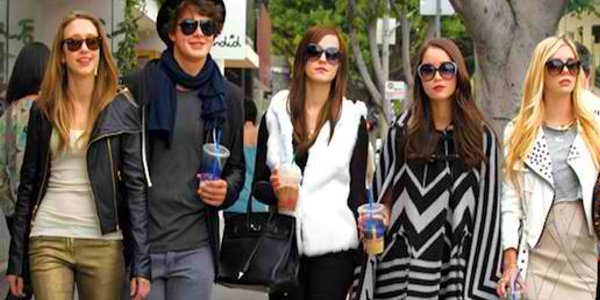3. The Characters

There's no doubt that Coppola intended us to dislike her characters some of the time, because they're grotesques, completely out of touch with reality and utterly unforgivable and irredeemable, because of the complete lack of self-awareness implied by the final shots of Emma Watson's character milking the situation for fame. But the problem is that there isn't even a spark of humanity to anchor us to the characters - in extreme character portraits like this, a good story-teller would engineer one of the characters to be the skewed moral heart of the story, to allow us an in-road to sympathise at least partly with the situation. Because, let's face it, sympathy is the best way to outrage an audience - it's why the most enduring villains have a spark of charisma, and why the least successful horrors are generally filled with entirely disposable characters. Coppola clearly tries it, making new boy Marc our link to the story - he is the indoctrinated character, joining a new group, who goes along with the situation to a degree - but ultimately, Coppola sells herself short in his characterisation. He is not sympathetic - his actions are in fact pathetic, as he might express doubts over the morality of the situation, but then he has his head turned by pretty shiny things. And as for the rest of them, they play like stereotypes out of Mean Girls without an ounce of humour (aside from the painful final few minutes) and the worst of it is that Coppola clearly makes their lives aspirational, even if she claims this to be a cautionary tale.
 There's no doubt that Coppola intended us to dislike her characters some of the time, because they're grotesques, completely out of touch with reality and utterly unforgivable and irredeemable, because of the complete lack of self-awareness implied by the final shots of Emma Watson's character milking the situation for fame. But the problem is that there isn't even a spark of humanity to anchor us to the characters - in extreme character portraits like this, a good story-teller would engineer one of the characters to be the skewed moral heart of the story, to allow us an in-road to sympathise at least partly with the situation. Because, let's face it, sympathy is the best way to outrage an audience - it's why the most enduring villains have a spark of charisma, and why the least successful horrors are generally filled with entirely disposable characters. Coppola clearly tries it, making new boy Marc our link to the story - he is the indoctrinated character, joining a new group, who goes along with the situation to a degree - but ultimately, Coppola sells herself short in his characterisation. He is not sympathetic - his actions are in fact pathetic, as he might express doubts over the morality of the situation, but then he has his head turned by pretty shiny things. And as for the rest of them, they play like stereotypes out of Mean Girls without an ounce of humour (aside from the painful final few minutes) and the worst of it is that Coppola clearly makes their lives aspirational, even if she claims this to be a cautionary tale.
There's no doubt that Coppola intended us to dislike her characters some of the time, because they're grotesques, completely out of touch with reality and utterly unforgivable and irredeemable, because of the complete lack of self-awareness implied by the final shots of Emma Watson's character milking the situation for fame. But the problem is that there isn't even a spark of humanity to anchor us to the characters - in extreme character portraits like this, a good story-teller would engineer one of the characters to be the skewed moral heart of the story, to allow us an in-road to sympathise at least partly with the situation. Because, let's face it, sympathy is the best way to outrage an audience - it's why the most enduring villains have a spark of charisma, and why the least successful horrors are generally filled with entirely disposable characters. Coppola clearly tries it, making new boy Marc our link to the story - he is the indoctrinated character, joining a new group, who goes along with the situation to a degree - but ultimately, Coppola sells herself short in his characterisation. He is not sympathetic - his actions are in fact pathetic, as he might express doubts over the morality of the situation, but then he has his head turned by pretty shiny things. And as for the rest of them, they play like stereotypes out of Mean Girls without an ounce of humour (aside from the painful final few minutes) and the worst of it is that Coppola clearly makes their lives aspirational, even if she claims this to be a cautionary tale.